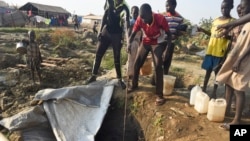The United Nations warned Monday that a sharp rise in food insecurity across South Sudan could result in catastrophic levels of hunger for at least 40,000 civilians.
This warning follows the release of the Integrated Food Security Phase Classification (IPC) report which estimates at least 2.8 million people, or 23 percent of the population, will face acute food and nutrition insecurity between January and March 2016.
The U.N.’s Food and Agriculture Organization says the situation likely will worsen between April and July, when food availability is traditionally at its lowest. And the IPC projects an early start to the lean season and a longer hunger period.
The majority of people facing acute food insecurity are in Unity, Jonglei and Upper Nile states and make up 57 percent of those in need.
The United Nations says many people there are scavenging swamps to survive, living off water lilies and fish. It says flood waters will recede in the coming month's dry season, leaving many people without the ability to find food, a situation it calls a potential "catastrophe.”
Erminio Sacco, the FAO's chief technical adviser for food security, agrees the upcoming dry season will make matters worse.
"The situation is very serious because we are now at the beginning of a long dry season and in most regions, people are running low and they will need to resort to buying food commodities in the coming month," he said.
"And due to the economic crisis, the prices are skyrocketing, so people will pay serious figures to secure food for their own families," Sacco said.
High inflation, high food cost
The Bank of South Sudan devalued its currency by 84 percent in December when it got rid of its fixed exchange rate, in a move designed to curb the losses triggered by the declining global price of crude oil.
The bank's decision quickly triggered hyperinflation in the market, boosting the consumer price index to 109.9 percent in December, which reflected a 13.7 percent increase from the previous month.
"Market functionality throughout the country has been affected, mainly due to the depreciation of the local currency, and most traders are not restocking, resulting in scarcity of commodities with high prices," the IPC report says.
Conflict erupted in December 2013 between President Salva Kiir and opposition leader Riek Machar, and has since displaced more than 2 million people and crippled the oil-dependent economy.
The U.N. is urging South Sudanese leaders to implement the peace agreement signed in August and allow free and unfettered access to conflict areas.
Continued clashes between government and rebel forces have killed tens of thousands of civilians and have displaced more than 2 million, according to the U.N. Office for the Coordination of Humanitarian Affairs.
"Families have been doing everything they can to survive but they are now running out of options," Jonathan Veitch, UNICEF representative in South Sudan said in the statement. "Many of the areas where the needs are greatest are out of reach because of the security situation. It's crucial that we are given unrestricted access now. If we can reach them, we can help them."





